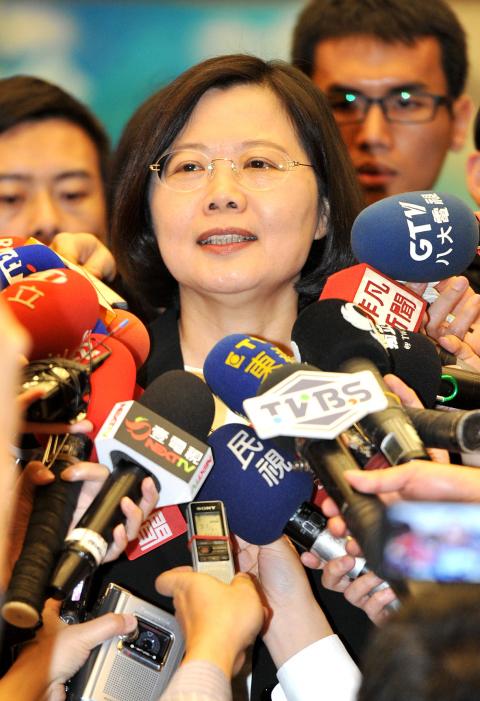Democratic Progressive Party (DPP) presidential hopeful Tsai Ing-wen (蔡英文) said yesterday she would not be responding to a media furor over her sexual orientation.
“There is nothing wrong with any gender, sexual orientation or marital status. Nobody has the right to question another [on this],” Tsai said in a short -300-word public statement.
Tsai said she would use the opportunity presented by the furor to promote awareness about discrimination, suggesting that an individual’s right to privacy concerning their sexual orientation was akin to a human rights issue. She said she would work to “eliminate gender discrimination in Taiwan.”

Photo: Chien Jung-fong, Taipei Times
“I will lead Taiwan as a country that respects human rights and is more accepting. I will also work to ensure that minority groups experience the same quality of life, happiness and respect on this piece of land as everyone else,” she added.
Former DPP chairman Shih Ming-teh (施明德) drew criticism on Thursday after he called on Tsai, who is single, to clarify her sexual orientation, saying that voters needed a “clear answer” before voting for her next year.
“She needs to be true to herself, her body, in order to be true to her beliefs and her country,” Shih said.
Lawmakers across party lines, as well as gay rights and feminist groups, have come to Tsai’s defense over the past two days, saying that it is irrelevant for the presidential hopeful to disclose such personal details.
The Taiwan Women’s Link on Friday called on Shih to either explain the relevancy of his remarks or “apologize to all single women, gays and female politicians.”
Tsai’s competitors in the DPP primaries also said they did not believe a candidate should be questioned on their sexual orientation.
“Taiwan cannot be like this and politics should not be like this. I do not think that it’s a good idea,” Su Tseng-chang (蘇貞昌) told reporters yesterday.
Hsu Hsin-liang (許信良) said he was “astonished” by Shih’s questions, which he called a violation of Tsai’s privacy.
In the statement, Tsai said she would “definitely not” respond to a line of questioning she characterized as “surprising” — considering Shih’s past work in Taiwan’s democracy and human rights movement.
“Because if I did, it would amount to recognizing his right to question anybody [on the issue],” Tsai said.
Asked whether she felt angered by the remarks at a later setting, she said she “wasn’t angry, did not care and did not plan to respond on the issue any further.”
Tsai, who has temporairily stepped down as DPP chairperson, has not been linked to anybody romantically in the past decade she has been a public figure.
The questions come at a sensitive time for her, with two weeks left before the telephone polls used to settle the primaries between April 25 and 29.

The CIA has a message for Chinese government officials worried about their place in Chinese President Xi Jinping’s (習近平) government: Come work with us. The agency released two Mandarin-language videos on social media on Thursday inviting disgruntled officials to contact the CIA. The recruitment videos posted on YouTube and X racked up more than 5 million views combined in their first day. The outreach comes as CIA Director John Ratcliffe has vowed to boost the agency’s use of intelligence from human sources and its focus on China, which has recently targeted US officials with its own espionage operations. The videos are “aimed at

STEADFAST FRIEND: The bills encourage increased Taiwan-US engagement and address China’s distortion of UN Resolution 2758 to isolate Taiwan internationally The Presidential Office yesterday thanked the US House of Representatives for unanimously passing two Taiwan-related bills highlighting its solid support for Taiwan’s democracy and global participation, and for deepening bilateral relations. One of the bills, the Taiwan Assurance Implementation Act, requires the US Department of State to periodically review its guidelines for engagement with Taiwan, and report to the US Congress on the guidelines and plans to lift self-imposed limitations on US-Taiwan engagement. The other bill is the Taiwan International Solidarity Act, which clarifies that UN Resolution 2758 does not address the issue of the representation of Taiwan or its people in

US Indo-Pacific Commander Admiral Samuel Paparo on Friday expressed concern over the rate at which China is diversifying its military exercises, the Financial Times (FT) reported on Saturday. “The rates of change on the depth and breadth of their exercises is the one non-linear effect that I’ve seen in the last year that wakes me up at night or keeps me up at night,” Paparo was quoted by FT as saying while attending the annual Sedona Forum at the McCain Institute in Arizona. Paparo also expressed concern over the speed with which China was expanding its military. While the US

SHIFT: Taiwan’s better-than-expected first-quarter GDP and signs of weakness in the US have driven global capital back to emerging markets, the central bank head said The central bank yesterday blamed market speculation for the steep rise in the local currency, and urged exporters and financial institutions to stay calm and stop panic sell-offs to avoid hurting their own profitability. The nation’s top monetary policymaker said that it would step in, if necessary, to maintain order and stability in the foreign exchange market. The remarks came as the NT dollar yesterday closed up NT$0.919 to NT$30.145 against the US dollar in Taipei trading, after rising as high as NT$29.59 in intraday trading. The local currency has surged 5.85 percent against the greenback over the past two sessions, central